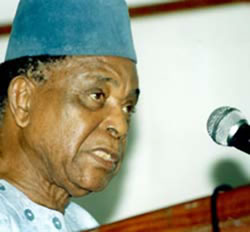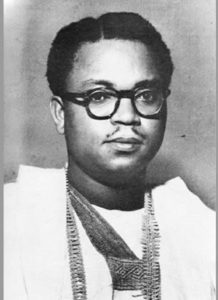 Chief Anthony Enahoro, (22nd July 1923-15th December 2010) was one of Nigeria’s foremost anti-colonial and pro-democracy activists. He was born the eldest of twelve children in Uromi in the present Edo State of Nigeria. His Esan parents were Anastasius Okotako Enahoro (d. 1968) and Fidelia Inibokun née Ogbidi Okojie (d. 1969). Chief Enahoro has had a long and distinguished career in the press, politics, the civil service and the pro-democracy movement. Educated at the Government School Uromi, Government School Owo and King’s College, Lagos, Chief Enahoro became the editor of Dr. Nnamdi Azikiwe’s newspaper, the Southern Nigerian Defender, Ibadan, in 1944 at the age of 21, thus becoming Nigeria’s youngest editor ever.
Chief Anthony Enahoro, (22nd July 1923-15th December 2010) was one of Nigeria’s foremost anti-colonial and pro-democracy activists. He was born the eldest of twelve children in Uromi in the present Edo State of Nigeria. His Esan parents were Anastasius Okotako Enahoro (d. 1968) and Fidelia Inibokun née Ogbidi Okojie (d. 1969). Chief Enahoro has had a long and distinguished career in the press, politics, the civil service and the pro-democracy movement. Educated at the Government School Uromi, Government School Owo and King’s College, Lagos, Chief Enahoro became the editor of Dr. Nnamdi Azikiwe’s newspaper, the Southern Nigerian Defender, Ibadan, in 1944 at the age of 21, thus becoming Nigeria’s youngest editor ever.

He later became the editor of Zik’s Comet, Kano, 1945-49, also associate editor West African Pilot, Lagos, editor-in-chief Morning Star, 1950-53.Chief Anthony Enahoro’s attempt to move the motion for Nigeria’s independence in 1953 failed. His motion was rejected by Parliament and the northern MP’s actually staged a walkout as a consequence of the attempt. The successful movement of the motion for Nigeria’s independence did not take place until 1958.After Enahoro’s initial attempt in 1953, Chief S.L. Akintola attempted to move the second motion for Nigeria’s independence in 1957 and though his motion was passed by Parliament it was not acquiesced to by the British colonial authorities and it therefore failed. The successful moving of the motion for Nigeria’s independence did not take place until August 1958 and this was done by Chief Remi Fani-Kayode. Fani-Kayode’s motion was not only passed by Parliament but it was also acquiesced to by the British. His motion had called for independence to be granted to Nigeria on April 2nd 1960 and though it was passed by Parliament and acquiesed to by the British a slight amendment proposing that the month of independence should be moved from April 2nd to October 1st was proposed by a fourth motion to Parliament by Sir Tafawa Balewa in 1959 and it was passed.As a consequence of that Nigeria gained her independence in 1960.
Married
10th January, 1954 to Helen Imayuse Ediae, daughter of Chief J. Ediae Idahosa, Aiwerioba of Benin. Blessed with five Children, four boys and One girl.
Early life
He was born the eldest of twelve children in Uromi in the present Edo State of Nigeria. His Esan parents were Anastasius Okotako Enahoro (d. 1968) and Fidelia Inibokun née Ogbidi Okojie (d. 1969). Chief Enahoro has had a long and distinguished career in the press, politics, the civil service and the pro-democracy movement. Educated at the Government School Uromi, Government School Owo and King’s College, Lagos, Chief Enahoro became the editor of Dr. Nnamdi Azikiwe’s newspaper, the Southern Nigerian Defender, Ibadan, in 1944 at the age of 21
Politics
During the Nigerian crisis that followed the 1966 coups, Chief Enahoro was the leader of the then Mid-West delegation to the Ad Hoc Constitutional Conference in Lagos. He later became Federal commissioner (Minister) for Information and Labour under the General Yakubu Gowon Military Government, 1967-74; Federal Commissioner for Special Duties, 1975. He later became member of the National Party of Nigeria, NPN, 1978-83. He was the president, World Festival of Negro Arts and Culture, 1972-75
Chief Enahoro was the chairman of the National Democratic Coalition (NADECO), a pro-democracy group that fought dictator Sani Abacha till Abacha’s death.
Chief Enahoro was conferred with the national honour of Commander, Order of the Federal Republic, CFR, in 1982, and is the chairman of the Movement for National Reformation, MNR; as well as the Pro-National Conference Organisation, PRONACO. He was awarded honorary DSC by the University of Benin in 1972. Among his publications include the treatise Fugitive Offender. Chief Enahoro played golf and followed cricket ardently. [1][2][3] Chief Enahoro was a delegate to most of the constitutional conferences leading to the independence of Nigeria in 1960.
Education
Govt. Sch., Uromi; Govt. Sch., Owo; Kings College, Courses and Training in Journalism, Government, etc, Lagos, London, and Washington, etc.
Crisis in Western Nigeria
During the 1962 crisis in the old Western region, he was detained along with other Action Group members. Accused of treason during the Awolowo alleged coup trial, Chief Enahoro escaped to the United Kingdom in 1963. He was extradited from the UK and imprisoned for treason. In 1966, he was released by the Military Government.
Career
1. Sub-Editor, West African Pilot, Lagos, 1943-44
2. Chairman, Nigerian Union of Students 1943-45
3. Chairman, Nigerian Youth Council, 1943-45
4. Editor, Southern Nigeria Defender, Warri, 1943-45
5. Associate Editor, West African Pilot, Lagos 1945
6. Editor, Daily Comet, Lagos, 1945-47
7. Thrice imprisoned for sedition during the struggle for independence, 1946, 1947, and 1947
8. Associate Editor, West African Pilot, Lagos, 1948-49
9. General Secretary, BOW (Benin-Ondo-Warri Provinces) State Movement, !949-50
10. Editor-in-Chief, Nigerian, Star Sapele, 1950-54.
11. General Secretary, Midwestern Action Group, 1950 – 1951
12. Assistant General Secretary, Action Group, 1951- 1957
13. Chairman, Ishan Divisional Council, 1952-54
14. Chairman, Uromi-Uzea District Council, 1953-54
15. Member, Western House of Assembly, 1952-59
16. Installed Senior Traditional Chieftaincy, “Adolor of Uromi”, 1958
17. Action Group Chief Whip, Federal House of Representatives, 1952-54
18. Director, Nigerian Coal Corporation, Enugu, 1952-54
19. Courses in Parliamentary Government, London, Belfast and Dublin, 1953-54
20. Courses and Seminars in Police Matters, Prisons and Cabinet Government, London, Ottawa and New York, and in Presidential System, Washington, 1954-55
21. Nigerian Delegate, Commonwealth Parliamentary Conference 1954
22. Minister of Home Affairs, Information and Midwest Affairs, Western Region, 1954-59
23. Leader of the House, Western House of Assembly, 1954-59
24. Leader of Nigerian Delegations, Conferences of World Parliamentarians and Scientists, Paris 1956 and London 1957.
25. Acting General Secretary, Action Group, 1957
26. Leader, Action Group Delegation to All Africa Peoples Conferences, Accra, and Chairman of the Conference Steering Committee, 1955
27. Member, Action Group Delegation, All Africa Peoples Conference, Tunis, 1960
28. Moved Crisis Motion in the House of representatives for Nigeria’s Self-Government 1953
29. Delegate, Constitutional Talks Preceding Independence 1953-59
30. Chairman, Action Group Midwest Area, 1958-59
31. Deputy National President, Action Group, 1958-66
32. Opposition Spokesmen on Foreign Affairs, Internal Affairs and Legislative Affairs, Federal House of Representatives, 1959-63
33. Member of the Founding Board, Ife University, 1959-62
34. Delegate, life University Governing Board to Soviet Union, 1961
35. In Detention during State of Emergency, Western Region, 1961
36. On Political Exile in Ghana and United Kingdom, 1963
37. Extradited from United Kingdom and Imprisoned for 13 years for treasonable Felony” 1963
38. Released by Military Government after Second Military Coup d’état, 1966
39. Leader, Midwestern State Delegation, National Constitutional Conference, 1966
40. Federal Commissioner (Minister) for Information, Labour, Cultural Affairs, Sports and Co-operatives, 1967-75
41. Leader Nigerian Delegation to United Nations, 1967
42. Member, Nigerian Delegations, OAU Heads of State Conferences, 1968-1974
43. Leader of Nigerian Delegations, Annual International labour Conferences (ILO), Geneva, 1968-75
44. International President, 2nd World Festival of Negro Arts and Culture (FESTAC), 1972 –75
45. Adviser, Nigerian Delegation, Commonwealth Heads of Government Conference, London, 1973
46. Federal Commissioner (Minister) for Special Duties 1975
47. Federal spokesman and leader of Federal Delegations, Civil War Peace Talks, London, Kampala and Addis Ababa, 1968-69
48. Chairman, National Party of Nigerian, Bendel State Branch, 1978-80
49. Chairman, Nigerian Shippers’ Council, 1982
50. National Chairman, Movement for National Reformation (MNR), 1992 to date
51. National Democratic Coalition (NADECO) Deputy Chairman 1994-96, Co-Chairman 1996-97, Chairman 1997-2000
52. Installed Chieftaincy “Okaku’o of Edoland”, 2000
53. National Chairman, National Reformation Party, Chairman, Pro National Conference Organisation (PRONACO)
54. Life President, Nigerian Professional Golfers’ Association
55. HONOURS:
(i) D.Sc. Honoris Cuasa, Political Science, University, 1973
(ii) Commander of the Order of the Federal Republic of Nigeria (CFR), 1982
(iii) Grand Officer of the Order of Merit, Central Africa Republic, 1973
(iv) Grand Star of the ORDER OF THE Nation, Senegal, 1973
(v) 1st Class Officer of the Order of the Two Niles, Sudan, 1974
(vi) Other Honours from Ethiopian, Uganda, New York, Philadelphia, etc
56. CLUBS:
(i) Benin Club, Benin City
(ii) Ikoyi Club, Lagos
(iii) Ikeja Golf Club, Ikeja
(iv) Sudbury Golf Club, Wembley, London
57. PUBLICATIONS:
(i) Pamphlet: “Zik: Saint or Sinner?” (Lagos, 1948)
(ii) Book: “Fugitive Offender” (Cassels, London 1965)
58 HOBBIES:
Golf, Farming, Reading, Travel
Sources: Jeeves, Wikipedia, NADECO, PRONACO, Dr Philip Idaewor
